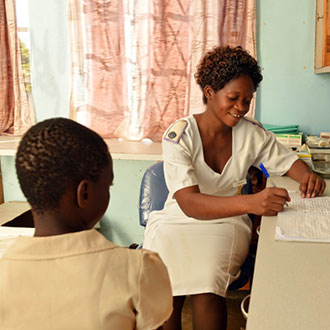
Tafadzwa Mudukuti is a primary care nurse at Chishapa Clinic in Shamva District of Zimbabwe’s Mashonaland Central Province. She has worked for the Ministry of Health and Child Care since 2008.
Tafadzwa Mudukuti is a primary care nurse at Chishapa Clinic in Shamva District of Zimbabwe’s Mashonaland Central Province. She has worked for the Ministry of Health and Child Care since 2008. In 2014, with support from the President’s Malaria Initiative (PMI), she received training on case management of malaria for the first time. Prior to this time, malaria was not common in this part of Zimbabwe. In recent years, however, the country has experienced a shift in the epidemiology of the disease, and malaria is now occurring in areas where it was not previously seen. Mashonaland Central Province is one of the provinces now seeing a higher number of malaria cases having the second highest malaria burden in the country in the two previous malaria seasons.
In the catchment area of the Chishapa Clinic, many people pan for gold, and to avoid the sun’s heat, they often work late into the night, exposing them to mosquitoes. In the 2012–2013 season, Chishapa catchment area suffered a malaria outbreak. Tafadzwa had difficulty managing all the cases of malaria that presented at her clinic. She had not received training on the current malaria case management guidelines – mandatory rapid diagnostic testing for all cases before treatment, nor was she trained on how to perform and read rapid diagnostic tests (RDTs). She and many other rural health workers either treated patients based on clinical diagnosis, or if they did test patients, they continued to provide arteminisin combination therapies (ACTs) even if test results were negative. This resulted in poor reporting and inconsistencies between the test rate and the ACT consumption rate. The provincial health officers soon realized the need to train rural health center staff on malaria case management.
In 2014, PMI supported training of 1,159 health workers in malaria case management; Tafadzwa was one of them. The three-day training included practical applications of skills such as patient assessment, RDT administration, and result interpretation.
After undertaking this training, Tafadzwa acquired the practical knowledge and expertise necessary for malaria case management and was able to confidently manage malaria cases. “Now, after testing my clients and finding them positive, I give them the right medicine and dosage with confidence that I have done the best that can be done for my clients,” she says with a broad, satisfied smile. She also highlighted that she now knows how to correctly fill in the malaria sections on data collection forms and checks for discordance in the information: “The number of ACTs dispensed is now tallying with the tested but positive cases. We no longer suffer stock-outs of malaria commodities.”
